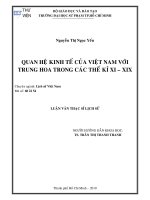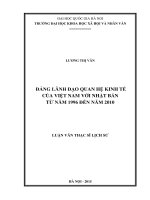Quản trị kinh doanh luôn là một trong những ngành hấp dẫn các bạn trẻ năng động, đặc biệt trong xu thế hội nhập kinh tế Quốc tế của Việt Nam những năm gần đây. Việc tìm hiểu rõ về ngành Quản trị kinh doanh giúp bạn định hướng nghề nghiệp tốt hơn trước kh
Bạn đang xem bản rút gọn của tài liệu. Xem và tải ngay bản đầy đủ của tài liệu tại đây (782.15 KB, 12 trang )
Chapter 5
Leadership Mind and Heart
1
Chapter Objectives
Recognize how mental models guide your
behavior and relationships.
Engage in independent thinking by staying
mentally alert, thinking critically, and being mindful
rather than mindless.
Breaking out of categorized thinking patterns and
open your mind to new ideas and multiple
perspectives.
Begin to apply systems thinking and personal
mastery to your activities at school or work.
2
Chapter Objectives (contd.)
Exercise emotional intelligence, including being
self-aware, managing your emotions, motivating
yourself, displaying empathy, and managing
relationships.
Apply the difference between motivating others
based on fear and motivating others based on
love.
3
Mental Models
Theories people hold
about specific systems in
the world and their
expected behavior
4
Ex. 5.2 The Perception Process
Environmental
stimuli
Observation via
the senses
Screening and
selecting stimuli
to process
further
Organizing
selected data
into patterns for
interpretation
and response
5
Stereotyping
The tendency to assign a person
to a group or broad category and
then to attribute widely held
generalizations about the group
to the individual
6
Leader’s Mind
Independent thinking
Questioning assumptions and interpreting data
and events according to one’s own beliefs,
ideas, and thinking, rather than pre-established
rules or categories defined by others
Mindfulness
The process of continuously reevaluating
previously learned ways of doing things in the
context of evolving information and shifting
circumstances
7
Systems Thinking
The ability to see the
synergy of the whole
rather than just the
separate elements of a
system and to learn to
reinforce or change
whole system patterns
8
Emotional Intelligence
A person’s abilities to perceive,
identify, understand, and
successfully manage emotions in
self and others
9
Ex. 5.5 Eight Families of Emotions
Enjoyment
Anger
Fear
Love
Disgust
Shame
Surprise
Sadness
10
Ex. 5.6 The Components of
Emotional Intelligence
Self-Awareness
•Emotional self awareness
•Accurate self-assessment
•Self-confidence
Self-Management
•Emotional self-control
•Trustworthiness
•Conscientiousness
•Adaptability
•Optimism
•Achievement-orientation
•Initiative
Social Awareness
•Empathy
•Organizational awareness
•Service orientation
Relationship Management
•Development of others
•Inspirational leadership
•Influence
•Communication
•Change catalyst
•Conflict management
•Bond building
•Teamwork and collaboration
11
Types of Motivation
Fear-based Motivation
Motivation based on fear of losing a job
Love-based Motivation
Motivation based on feeling valued in the
job
12









